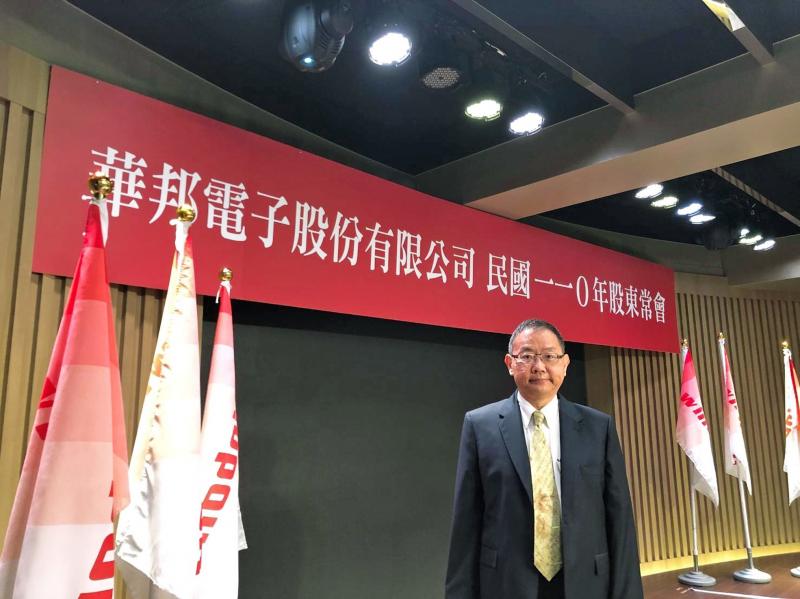Memorychip maker Winbond Electronics Corp (華邦電子) is ramping up recruitment efforts to meet increasing demand as its new fab in Kaohsiung is set to increase production next year, the Taichung-based firm said yesterday.
The chipmaker is planning to hire more than 400 engineers with various specializations for its fabs in Kaohsiung, Taichung, Hsinchu and Taipei, Winbond said in a statement.
The Kaohsiung fab is set to produce a small volume of DRAM chips in July next year in preparation for regular production in October, Winbond said.

Photo courtesy of Winbond Electronics Corp
The capacity expansion comes amid the chipmaker’s struggles to keep up with demand and more customers signaling interest in long-term supply deals.
The Kaohsiung 12-inch plant would have a target capacity of 35,000 wafers per month, with Winbond planning to install equipment in several stages, it said.
The firm is planning to invest NT$335 billion (US$12.08 billion) over a 10-year period, it added.
In the initial stage, the fab would be capable of making 10,000 wafers per month, using 25-nanometer technology, Winbond said.
Once the new facility starts regular production, it would boost the firm’s overall production capacity by 15 to 25 percent, Winbond said.
The chipmaker is planning to spend NT$11.8 billion on new facilities and chipmaking equipment this year, up from NT$790 million last year.
Winbond said it expects the capital expenditures to remain high next year as most manufacturing equipment would be installed then.
Winbond makes flash memory chips and DRAM chips, which each accounted for about half of the company’s memorychip revenue of NT$14.49 billion in the second quarter of this year.
The company is to conduct job interviews online next week, as it seeks to reduce in-person contacts amid the COVID-19 pandemic, it said.
Winbond has increased employee benefits to retain and attract chipmaking talent, as most local electronics companies, semiconductor firms in particular, are struggling to fill job vacancies, it said.
Since July, Winbond has been offering paid leaves for employees to get vaccinated against COVID-19 and deal with pandemic-specific needs, the chipmaker said, adding that COVID-19 treatment is covered in its in-house health insurance policy.

STEEP DECLINE: Yesterday’s drop was the third-steepest in its history, the steepest being Monday’s drop in the wake of the tariff announcement on Wednesday last week Taiwanese stocks continued their heavy sell-off yesterday, as concerns over US tariffs and unwinding of leveraged bets weighed on the market. The benchmark TAIEX plunged 1,068.19 points, or 5.79 percent, to 17,391.76, notching the biggest drop among Asian peers as it hit a 15-month low. The decline came even after the government on late Tuesday authorized the NT$500 billion (US$15.2 billion) National Stabilization Fund (國安基金) to step in to buoy the market amid investors’ worries over tariffs imposed by US President Donald Trump. Yesterday’s decline was the third-steepest in its history, trailing only the declines of 2,065.87 points on Monday and

TAKING STOCK: A Taiwanese cookware firm in Vietnam urged customers to assess inventory or place orders early so shipments can reach the US while tariffs are paused Taiwanese businesses in Vietnam are exploring alternatives after the White House imposed a 46 percent import duty on Vietnamese goods, following US President Donald Trump’s announcement of “reciprocal” tariffs on the US’ trading partners. Lo Shih-liang (羅世良), chairman of Brico Industry Co (裕茂工業), a Taiwanese company that manufactures cast iron cookware and stove components in Vietnam, said that more than 40 percent of his business was tied to the US market, describing the constant US policy shifts as an emotional roller coaster. “I work during the day and stay up all night watching the news. I’ve been following US news until 3am

Six years ago, LVMH’s billionaire CEO Bernard Arnault and US President Donald Trump cut the blue ribbon on a factory in rural Texas that would make designer handbags for Louis Vuitton, one of the world’s best-known luxury brands. However, since the high-profile opening, the factory has faced a host of problems limiting production, 11 former Louis Vuitton employees said. The site has consistently ranked among the worst-performing for Louis Vuitton globally, “significantly” underperforming other facilities, said three former Louis Vuitton workers and a senior industry source, who cited internal rankings shared with staff. The plant’s problems — which have not

TARIFF CONCERNS: The chipmaker cited global uncertainty from US tariffs and a weakening economic outlook, but said its Singapore expansion remains on track Vanguard International Semiconductor Corp (世界先進), a foundry service provider specializing in producing power management and display driver chips, yesterday withdrew its full-year revenue projection of moderate growth for this year, as escalating US tariff tensions raised uncertainty and concern about a potential economic recession. The Hsinchu-based chipmaker in February said revenues this year would grow mildly from last year based on improving supply chain inventory levels and market demand. At the time, it also anticipated gradual quarter revenue growth. However, the US’ sweeping tariff policy has upended the industry’s supply chains and weakened economic prospects for the world economy, it said. “Now